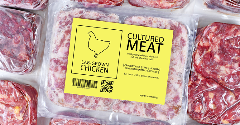News
Nestlé implements Nutri-Score system in Southern Europe
21 Jun 2020Nestlé has extended the use of the French-based Nutri-Score system to its products sold in Spain and Portugal. With this initial rollout, the scoring system will be printed on breakfast cereals Fitness Original, Nesquik Alphabet and Chocapic Bio as well as Garden Gourmet plant-based food.
In Spain and Portugal the number of products using this labeling system will continue to expand to incorporate the entirety of the Nestlé portfolio over the course of two years. Additionally, Cereal Partners Worldwide, the international breakfast venture between Nestlé and General Mills, will also implement Nutri-Score on its product packaging in the same countries.

Nutri-Score is now on Nestlé products in eight countries: Austria, Belgium, France, Germany, Luxembourg, Portugal, Spain and Switzerland. The Swiss CPG giant has publicly supported the labeling system and was part of a coalition that issued a call in April for Nutri-Score to become the standard across the European Union. Nutri-Score is currently only applied on a voluntary basis.
This color-coded system, which debuted in France in 2017, is gaining popularity in continental Europe. Using a bar featuring a green to red color gradient, it gives a score ranging from A (healthier choices) to E (less healthy choices). Studies have indicated that this front-of-pack labeling scheme has been successful in helping consumers select healthier choices at a glance.
However, there is still some resistance to this approach, and the European Commission did not endorse this scheme in its recently-released Farm to Fork strategy. Instead, the Commission noted that it will propose a harmonized label solution by the end of 2022.
Although Germany is on the list of countries where Nestlé has implemented its Nutri-Score system, the German Sugar Industry Association spoke out against the method saying that the algorithm used to evaluate a product’s score could mislead consumers. Similarly, the Italian government said that the labeling system singles out traditional Italian products such as Parmigiano Reggiano and extra virgin olive oil as unhealthy due to their fat and calorie content.
Despite this criticism, Nestlé remains committed to implementing this system. With the introduction of the Spanish and Portuguese markets into its labeling scheme, the company now has over 7,500 products across Europe using this visual system. Likely the march toward Nestlé Nutri-Score standardization will continue. “Nutri-Score works with consumers in Europe and it has the potential to become the EU-wide system," said Marco Settembri, Nestlé CEO for Zone Europe, Middle East and North Africa said in a statement.
Related news

‘Health’ labels on products reduce consumers’ willingness to pay
10 Mar 2025
A study into front-of-packaging “health” labelling finds that these labels alone can lower US consumers’ willingness to pay.
Read more
Food industry lags on healthier product formulation, nutrition index finds
7 Mar 2025
The world’s biggest food manufacturers derive just 34% of their sales from healthier products, according to the 2024 Global Access to Nutrition Index.
Read more
Does calorie labelling lead to reduced consumption?
27 Feb 2025
Calorie labelling of food products leads to a small, but consistent, reduction in the number of calories consumed, a study suggests.
Read more
F&B industry hit with fresh greenwashing claims
26 Feb 2025
The food and beverage (F&B) industry is under fresh scrutiny amid claims of greenwashing, with Arla the latest company in the firing line.
Read more
Have scientists discovered a new tool to measure UPFs?
19 Feb 2025
Researchers have developed a new scoring system and database, compiling over 50,000 food items, of which over 1,000 are classified as ultra-processed.
Read more
Singapore explores farmland-free food production
17 Feb 2025
Researchers discover new technology replicating on-farm food production conditions from within the indoor lab environment.
Read more
Most consumers lack trust in AI, but supplement users are ready to embrace the technology
14 Feb 2025
A survey of UK and US consumers found that most supplement users are willing to let AI make decisions on their behalf, but they also demand greater transparency.
Read more
Indians enjoy first bites of cultivated chicken
13 Feb 2025
The first public tasting of cultivated meat in India has taken place as the country prepares for the first commercial cultivated meat products – potentially as early as the end of this year.
Read more
Disruptor brands spearhead sustainable solutions
11 Feb 2025
Manufacturers, big and small, sharpen their focus by providing sustainable products and services centred on comprehensive and sustainable approaches to traditional methods.
Read more
The future of UPF regulation: Stricter labelling, more taxation, and no more conflicts of interest?
10 Feb 2025
Policymakers are intensifying efforts to regulate ultra-processed foods (UPFs), as mounting evidence links their consumption to increased risks of obesity, cardiovascular disease, and other chronic health issues.
Read more